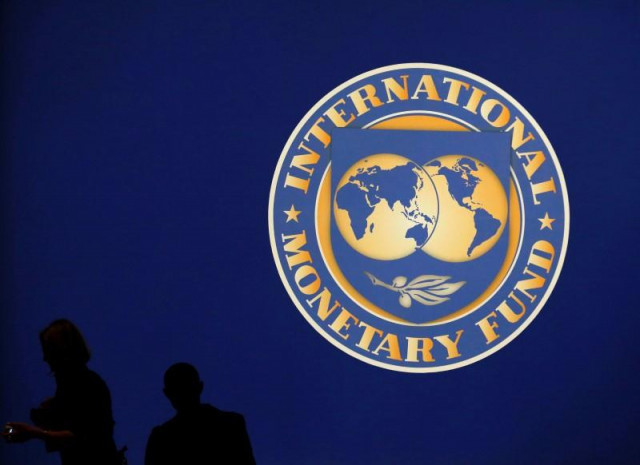Door left ajar for IMF-Islamabad agreement
Release of third loan tranche hinges on new tax collection measures, electricity price hike

PHOTO: REUTERS
In a first serious challenge to keep the $6 billion extended fund facility on track, Pakistan and the International Monetary Fund on Friday could not reach a staff-level agreement on contentious issues but kept the doors open for the possibility of attaining one in coming days.
The issues that stopped both the parties from reaching an agreement include the need for a mini-budget, new tax collection target for the Federal Board of Revenue and hike in electricity prices.
The IMF mission remained engaged in hectic negotiations with Pakistani authorities for 11 days but returned to Washington without reaching a staff-level agreement.
“The mission and the authorities made significant progress in the discussions on policies and reforms. In the coming days progress will continue to pave the way for the IMF Executive Board’s consideration of the review,” according to a statement issued by the IMF at the conclusion of its mission’s visit to Pakistan.
The IMF said that steadfast progress on programme implementation would pave the way for the review.
Pakistan to continue talks with IMF review team today
The IMF would release the third loan tranche only after a staff-level agreement is reached and approved by the IMF Executive Board.
“Pakistan’s case will go to the IMF board only when Islamabad fulfils the conditions,” said Dr Zubair Khan, an economist, while talking at The Review Programme – the prime time economic and national security affairs talk show. He said that it was an opportunity for Pakistan to renegotiate the programme.
The wording of the IMF handout was unusual, affirming that Pakistan and the IMF would have to cover a lot of ground before reaching a staff-level agreement.
The title of the IMF’s second review mission statement was ‘the conclusion of the IMF mission to Pakistan’.
The title of November 8, 2019 first review statement was ‘IMF reaches staff-level agreement with Pakistan on the First Review under the Extended Fund Facility’.
The IMF mission, led by Ernesto Ramirez Rigo, visited Islamabad during February 3-13, to initiate discussions on the second review of the authorities’ economic reform programme.
It was for the first time in seven months that the 39-month programme has faced serious challenges, which if not resolved soon may derail the programme. The IMF was fully satisfied with Pakistan’s progress during July-December period but was concerned about the future roadmap.
The sources said that the most troubling outstanding issue was the IMF’s insistence on bringing Rs200 billion mini-budget to achieve the tax collection target. Both the sides could not agree on a new FBR target even after the already twice downward revised target of Rs5.238 trillion has become irrelevant.
The other issue was the increase in electricity prices. But Prime Minister Imran Khan made it clear on Friday that his government would not further increase the electricity prices.
The sources said that Pakistan was hopeful to reach a staff-level agreement in coming days. They said that a middle ground has been found, which now needs endorsement of IMF management and its board. In case, Pakistan and the IMF give some concessions to each other, a new press release would be issued by the IMF.
“The IMF staff team had constructive and productive discussions with the Pakistani authorities and commended them on the considerable progress made during the last few months in advancing reforms and continuing with sound economic policies,” stated the IMF.
The IMF said that considerable progress was made in the last few months in advancing reforms and continuing with sound economic policies. All end-December performance criteria were met, and structural benchmarks have been completed.
Pakistan over-performed on the target of restricting primary budget deficit to Rs145 billion and instead posted a primary budget surplus of Rs286 billion on back of Rs426 billion higher profits from the central bank, one-off telecom licence fees and Rs323 billion provincial cash surpluses.
The government also met the target of restricting the stock of sovereign guarantees below Rs1.76 trillion and the guarantees remained at around Rs1.6 trillion.
Power tariff, mini-budget sticking points in talks with IMF
Similarly, new borrowings from the central bank remained nil and the government did not accumulate external public payment arrears.
The net international reserves target of negative $16.1 billion, restricting creation of net domestic assets to Rs8.8 trillion and lowering the currency swap exposure to below $8 billion were almost met.
The short-term currency swaps stood at $4.2 billion after the central bank bought nearly $4 billion from the exchange market.
The IMF stated that the macroeconomic outlook remained broadly unchanged as expected at the time of the first review. “Economic activity has stabilised and remains on the path of gradual recovery,” it added.
The current account deficit has declined, helped by the real exchange rate that is now broadly in line with fundamentals, while international reserves continue to rebuild at a pace considerably faster than anticipated.
The IMF said that inflation should start to see a declining trend as the pass-through of exchange rate depreciation has been absorbed and supply-side constraints appear to be temporary. The fiscal performance in the first half of the fiscal year remained strong with the general government registering a primary surplus of 0.7% of the GDP on the back of strong domestic tax revenue growth. Development and social spending have been accelerated, it added.


1733130350-0/Untitled-design-(76)1733130350-0-208x130.webp)
















COMMENTS
Comments are moderated and generally will be posted if they are on-topic and not abusive.
For more information, please see our Comments FAQ